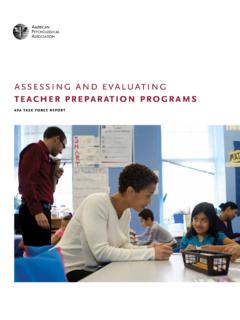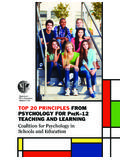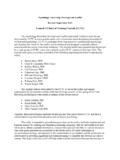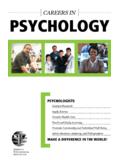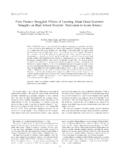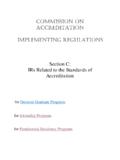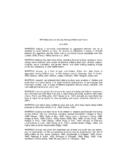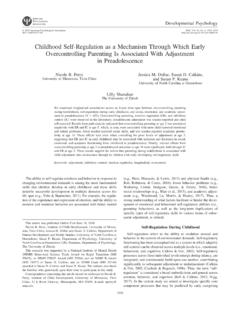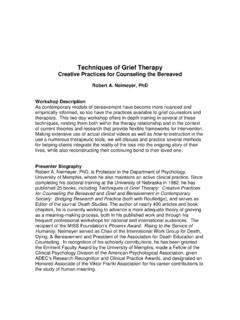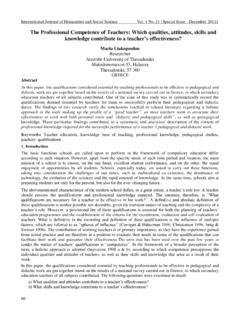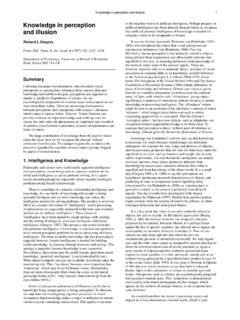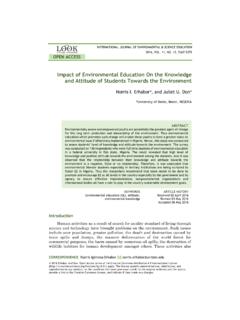Transcription of Knowledge Does Not Protect Against Illusory Truth
1 Knowledge Does Not Protect Against Illusory TruthLisa K. FazioVanderbilt UniversityNadia M. BrashierDuke UniversityB. Keith PayneUniversity of North Carolina at Chapel HillElizabeth J. MarshDuke UniversityIn daily life, we frequently encounter false claims in the form of consumer advertisements, politicalpropaganda, and rumors. Repetition may be one way that insidious misconceptions, such as the belief thatvitamin C prevents the common cold, enter our Knowledge base. Research on the Illusory Truth effectdemonstrates that repeated statements are easier to process, and subsequently perceived to be moretruthful, than new statements. The prevailing assumption in the literature has been that knowledgeconstrains this effect ( , repeating the statement The Atlantic Ocean is the largest ocean on Earth willnot make you believe it). We tested this assumption using both normed estimates of Knowledge andindividuals demonstrated Knowledge on a postexperimental Knowledge check (Experiment 1).
2 Contraryto prior suppositions, Illusory Truth effects occurred even when participants knew better. Multinomialmodeling demonstrated that participants sometimes rely on fluency even if Knowledge is also availableto them (Experiment 2). Thus, participants demonstrated Knowledge neglect, or the failure to rely onstored Knowledge , in the face of fluent processing : Illusory Truth , fluency, Knowledge neglectSupplemental materials: encounter many misleading claims in our daily lives, someof which have the potential to affect important decisions. Forexample, many people purchase toning athletic shoes to improvetheir fitness or take preventative doses of vitamin C to avoidcontracting a cold. How do such misconceptions enter our knowl-edge base and inform our choices? One key factor appears to berepetition: Repeated statements receive higher Truth ratings thannew statements, a phenomenon called theillusory Truth , Goldstein, and Toppino s (1977)seminal study,cognitive, social, and consumer psychologists have replicated thebasic effect dozens of Illusory Truth effect is robust to many procedural most studies use obscure trivia statements ( ,Bacon,1979), the effect also occurs for assertions about consumer prod-ucts (Hawkins & Hoch, 1992; Johar & Roggeveen, 2007) and forsociopolitical opinions (Arkes, Hackett, & Boehm, 1989).
3 Illusorytruth occurs when people are only exposed to general topics ( ,hen s body temperature), then later asked to evaluate specificstatements ( , The temperature of a hen s body is about104 F; Begg, Armour, & Kerr, 1985; see alsoArkes, Boehm, &Xu, 1991). The effect emerges after delays of minutes ( ,Begg& Armour, 1991;Schwartz, 1982), weeks (Bacon, 1979;Giger-enzer, 1984), and months (Brown & Nix, 1996). Moreover,Gig-erenzer (1984)replicated the effect outside of the laboratory set-ting using representative samples and naturalistic work suggests that the ease with which people compre-hend statements ( , processing fluency) underlies the illusorytruth effect. Repetition makes statements easier to process ( ,fluent) relative to new statements, leading people to the (some-times) false conclusion that they are more truthful (Unkelbach,2007;Unkelbach & Stahl, 2009). Indeed, Illusory Truth effectsarise even without prior exposure people rate statements pre-sented in high-contrast ( , easy-to-read) fonts as true moreoften than those presented in low-contrast fonts (Reber & Schwarz,1999;Unkelbach, 2007).
4 Fluency informs a variety of judgments( , liking, confidence, frequency; seeAlter & Oppenheimer,2009;Iyengar & Lepper, 2000;Schwartz & Metcalfe, 1992;Tver-sky & Kahneman, 1973), likely because it serves as a valid cue inour day-to-day lives (Unkelbach, 2007).Given the strong, automatic tendency to rely on fluency, whendo people use other cues to evaluate truthfulness? The chiefconstraint on Illusory Truth identified in the literature is , Anas, and Farinacci (1992), for example,paired statements with trustworthy or untrustworthy voices. Attest, statements previously spoken by untrustworthy voices re-This article was published Online First August 24, K. Fazio, Department of Psychology and Human Development,Vanderbilt University; Nadia M. Brashier, Department of Psychology andNeuroscience, Duke University; B. Keith Payne, Department of Psychol-ogy, University of North Carolina at Chapel Hill; Elizabeth J. Marsh,Department of Psychology and Neuroscience, Duke research was supported by a Collaborative Activity award from theJames S.
5 McDonnell Foundation (Elizabeth J. Marsh). A National ScienceFoundation Graduate Research Fellowship supported Nadia M. concerning this article should be addressed to Lisa , 230 Appleton Place #552, Vanderbilt University, Nashville, TN37203. document is copyrighted by the American Psychological Association or one of its allied article is intended solely for the personal use of the individual user and is not to be disseminated of Experimental Psychology: General 2015 American Psychological Association2015, Vol. 144, No. 5, 993 10020096-3445/15/$ lower Truth ratings than new items ( , reverse illusorytruth effect). Multinomial process modeling shows that people relyon fluency only if they fail to recollect whether or not a statementcame from a credible source (Unkelbach & Stahl, 2009). However,people may not spontaneously retrieve source information (R. , Landau, & Hicks, 1997); Henkel and Mattson (2011)foundthat after a 2 3 week delay, participants exhibited an Illusory trutheffect for statements that they later identified (correctly or incor-rectly) as coming from an unreliable source.
6 This result fits withthe well-documented finding that much of the information in theknowledge base comes to mind relatively automatically, withoutthe experience of reliving the original learning event (Barber,Rajaram, & Marsh, 2008; Conway, Gardiner, Perfect, Anderson, &Cohen, 1997;Dewhurst, Conway, & Brandt, 2009; Herbert &Burt, 2001,2003,2004;Merritt, Hirshman, Zamani, Hsu, & Ber-rigan, 2006).The other assumed constraint on the Illusory Truth effect ispre-experimental Knowledge . A recent meta-analytic review cap-tures the literature as follows: Statements have to be ambiguous,that is, participants have to be uncertain about their Truth statusbecause otherwise the statements truthfulness will be judged onthe basis of their Knowledge (Dech ne, Stahl, Hansen, & W nke,2010, p. 239). Very few studies directly test this assumption,perhaps because it is so intuitive and andStahl (2009)tested their multinomial model with obscure materials( Knowledge parameter probabilities ranged from.)
7 01 to .05), be-cause the authors presupposed, but did not test, a strong negativerelationship between Knowledge and Illusory Truth . An abundanceof empirical work demonstrates that fluency affects judgments ofnew information, but how does fluency influence the evaluation ofinformation already stored in memory?Several studies indirectly examined the role of Knowledge bytesting domain experts: That is, do people with more knowledgeabout a particular topic show an Illusory Truth effect in thatdomain? Unfortunately, different studies yielded different answersto this question. For example,Srull (1983)asked self-rated carexperts and nonexperts to rate trivia statements about cars ( , The Cadillac Seville has the best repair record of any Americanmade automobile ). No statistics were reported, but experts pro-duced a numerically smaller Illusory Truth effect than and Toth (2006)found similar results when participantsrated claims about known and unknown companies ( , Chap-Stick vs.
8 Raven s). Claims embedded in meaningful contexts (flu-ent) received higher Truth ratings than those in irrelevant contexts(disfluent); critically, the Illusory Truth effect was more pro-nounced for unknown than known brands. In contrast to these twostudies,Arkes, Hackett, and Boehm (1989)demonstrated thatexpertise increased susceptibility to the illusion. They exposedparticipants to statements from seven domains ( , food, litera-ture, entertainment), then asked them to rank order their knowl-edge about these topics. Illusory Truth occurred for statements fromhigh-expertise domains, but not for statements from low-expertisedomains. Similar conclusions were drawn from a study wherepsychology majors and nonmajors rated statements about psychol-ogy (Boehm, 1994). Psychology majors exhibited a larger illusorytruth effect than nonmajors, corroborating Arkes and colleagues finding that domain Knowledge can hurt rather than , these studies on expertise targeted specific facts thatparticipants would not know, even the domain experts.
9 In otherwords, they tested the effect of related Knowledge , rather than thatof Knowledge for individual statements, so it is unclear whatconclusions to draw. only one study addressed the role of knowl-edge for specific facts, rather than broad (2007)conducted a study of perceptual fluency with known ( , Aristotle was a Japanese philosopher ) and unknown ( , Thecapital of Madagascar is Toamasina ) items. Some statementsappeared in high-contrast font colors ( , fluent), whereas othersappeared in low-contrast font colors ( , disfluent). Replicatingprevious research (Reber & Schwarz, 1999), participants ratedfluent items as true more often than disfluent items. The inter-action between fluency and Knowledge was not significant, withsimilar trends for known and unknown items. When tested sepa-rately, however, Illusory Truth occurred for unknown, but notknown, statements. Ceiling effects in the known condition ( ,strong bias to respond true ) render these data summarize, Illusory Truth generalizes across a remarkablywide range of factors.
10 In the absence of source recollection, theonly constraint commonly identified is that participants must lackknowledge about the statements veracity. In two experiments, weevaluate the claim that Illusory Truth effects do not occur if peoplecan draw upon their stored Knowledge . We used two types ofstatements: contradictions of well-known facts and contradictionsof facts unknown to participants. We defined Knowledge usingNelson and Narens s (1980)norms, as well as individuals perfor-mance on a postexperimental Knowledge check (Experiment 1). Inaddition, we created two competing multinomial models of theway people evaluate statements truthfulness. The Knowledge -conditional model reflects the assumption that people search mem-ory for relevant information, only relying on fluency if this searchis unsuccessful. The fluency-conditional model, on the other hand,posits that people can rely solely on fluency, even if storedknowledge is available to them.
